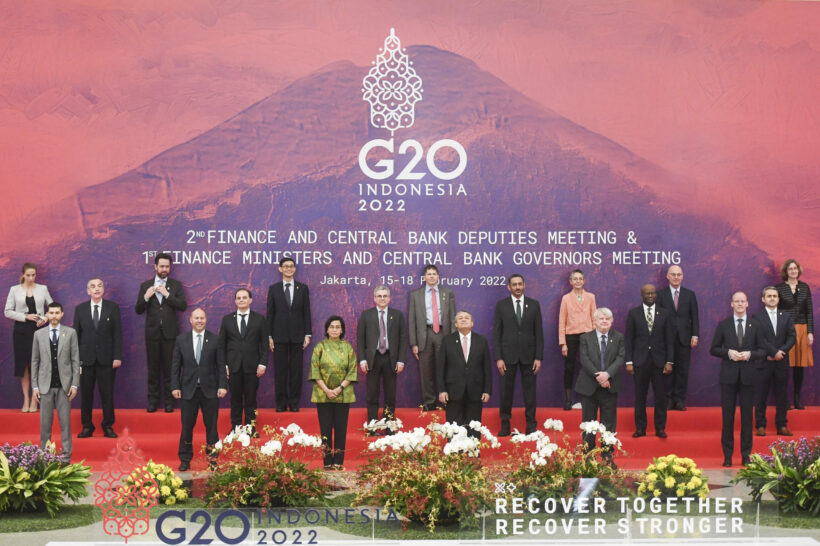Menteri Keuangan Sri Mulyani Indrawati (ketiga kiri depan), Gubernur Bank Indonesia Perry Warjiyo (ketiga kanan depan), Menteri Keuangan Australia Josh Frydenberg (kedua kiri depan), Menteri Keuangan Uni Emirat Arab Mohamed Bin Hadi Al Hussaini (kiri depan), Senior Deputi Gubernur Bank Sentral Italia Luigi Federico Signorini (kedua kanan depan), Chair Financial Stability Board Klaas Knot (kanan depan) dan para kepala delegasi pertemuan tingkat Menteri Keuangan dan Gubernur Bank Sentral atau Finance Ministers and Central Bank Governors Meeting (FMCBG) Presidensi G20 Indonesia mengikuti sesi foto bersama di Jakarta Convention Center, Jakarta, Kamis (17/2/2022). Pertemuan yang berlangsung pada 17-18 Februari 2022 itu merupakan rangkaian pertemuan di Jalur Keuangan dalam Presidensi G20 Indonesia yang membawa enam agenda prioritas, yakni exit strategy untuk mendukung pemulihan yang adil, pembahasan scarring effect untuk mengamankan pertumbuhan masa depan, sistem pembayaran di era digital, keuangan berkelanjutan, inklusi keuangan, dan perpajakan internasional. ANTARA FOTO/Hafidz Mubarak A/POOL
Disclaimer: This post reflects solely the opinion of the authors and should not be taken to represent the general views of IPPR’s management/ editorial team or those of fellow authors
Background
This blog post will discuss the G20 summit happening in 2022. The author finds it important to discuss as his country of nationality, Indonesia, is presiding the G20 and is going to host G20’s high-stakes summit. The world is just recovering from the worst public health and economic crises in a century, yet the Russian invasion of Ukraine and its economic repercussions pose greater challenges as costs of living continue to go up. What can we expect from the summit in Bali this November?
Image of a G20 Summit billboard in Bali’s Ngurah Rai Airport (own photograph) and one of Bali’s waterfalls as the island’s natural features (own photograph). Bali is the host of the summit.
Host and G20 chair profile: Indonesia
Indonesia is the world’s fourth most-populous country, with a population of nearly 280 million, and the world’s largest archipelago. After 32 years of Suharto’s military dictatorship, Indonesia ran free and fair elections in 1999, marking a transition towards democracy. Indonesia became the world’s third-largest democracy, yet challenges to democratic governance continue to persist. The global phenomenon of democratic backsliding impacted Indonesia’s fragile democracy recently, including during the Covid-19 pandemic. The pandemic exposed Indonesia’s fragile political dynamics in addition to pre-existing issues in health infrastructure. During the pandemic, the country became the most affected in Southeast Asia with more than 6 million cases and 150 thousand deaths, although the numbers may be an undercount due to difficulties in testing at the earlier waves of the pandemic. Only after the catastrophic July 2021 Delta variant wave and lockdown, Indonesia could control the pandemic, including during the early 2022 Omicron variant wave which produced fewer hospitalisations and deaths. While concerns about democratic backsliding and the impacts of the Covid-19 pandemic hit Indonesia’s domestic politics, what does Indonesia have on the foreign policy front?
On the foreign policy front, Indonesia has been adopting a “Free and Active” foreign policy. This policy aims to avoid involvement in conflict with major powers, albeit maintaining diplomatic relations. Indonesia was one of the founding members of the Association of South-East Asian Nations (ASEAN) with that organisation being Indonesia’s partner to maintain regional peace and security. Being one of the world’s largest economies, Indonesia joined G20 in 2008 and has become the voice for ASEAN and the developing world in the G20. As a voice of the developing world, Indonesia continued to rally for vaccine equity during the Covid-19 pandemic. This is because many in the developing world struggled to get the Covid-19 vaccine whilst the developed world reopened their economies.
Image: Covid-19 mass vaccination in Jakarta’s Gelora Bung Karno Stadium overseen by Jakarta Governor Anies Baswedan (left, with visor and white shirt) and Indonesian President Joko Widodo (right, with white long-sleeve shirt) (Source: Kompas)
Indonesia’s position as a developing country yet a member of the G20 puts it as a newly industrialised emerging market. Agriculture contributes to Indonesia’s economy significantly, with a notable exported commodity being palm oil, notoriously known for its impact on Indonesia’s rainforests, orangutans, and wildfire-related haze. Manufacturing helps accelerate Indonesia’s economic growth. In addition, Indonesia depends on tourism, particularly Bali island, which is unique for significantly attracting foreign tourists. The same island is hosting the G20 summit. Although the Covid-19 pandemic sharply impacted Indonesia’s economic growth, the reopening of the economy allowed Indonesia to economically recover. Economic recovery is the central theme of this year’s summit.
This year’s G20 summit
The G20 summit is an annual forum discussing international economic issues and maintaining economic stability. It is an important conference as it hosts countries that account for 80% of global economic output, 75% of exports and 60% of the world population. Members of the G20 include long-standing liberal democracies such as the United States, United Kingdom, Germany and the European Union; developing countries such as Brazil; East Asian powerhouses China, South Korea and Japan; and even authoritarian oil exporters Saudi Arabia and Russia. This organisation spans different political regimes but with economic capabilities that make them emerge as the world’s top 20 economies. G20 summits may allow discussions on the sidelines beyond traditional geopolitical rigidness and tensions, and even discuss threats to the global economy such as climate change, global health, gender equity, war, conflict, migration and terrorism.
This year’s G20 summit tagline is “Recover Together, Recover Stronger” (Indonesian: Bangkit bersama, bangkit lebih kuat). The tagline comes with the backdrop of economic recovery after the Covid-19 pandemic. Under Indonesia’s G20 presidency, the summit will address the need for collective action in global health infrastructure and equity, especially on the distribution of Covid-19 vaccines. The summit will additionally address sustainable, inclusive economic recovery; energy transition, and climate-resilient investment; alongside digital transformation. Some challenges can impede the summit and Indonesia’s G20 presidency as a whole.
Challenges and controversies
The G20 summit this year is not without controversy. Both the United States, Canada, United Kingdom, France, Germany, other European Union-represented countries, and Russia are members of the G20. However, Russia’s invasion of Ukraine deteriorated relations between Russia and the Western world. The West has imposed sanctions against Russia including the top of Russia’s government and cut off Russian banks from the international banking communication system. United States President Joe Biden called for the removal of Russia from the G20 or the participation of Ukraine in the November 2022 summit. Canada echoed similar sentiments. Many G20 meetings before the November 2022 summit involved Western walk-outs and calls for the boycott of Russian presence. Yet, there are other G20 members that support Russia’s participation in the G20, such as China and Brazil. China continues to value Russia’s importance in the G20 and even asked Indonesia to keep the War in Ukraine off the November 2022 summit agenda. Therefore, Russia’s invasion of Ukraine challenges Indonesia’s leadership in the G20 and Indonesia’s impartial “Free and Active” foreign policy as a whole given the polarisation among G20 members supporting and condemning Russia’s presence. Indonesia eventually invited Ukrainian President Volodymyr Zelensky and Russian President Vladimir Putin to the summit, affirming that the G20 is not the appropriate forum for war and conflict, but for economic prosperity.
Image: Western finance officials walking out due to a Russian official’s speech at a 2022 G20 meeting in Washington DC (Source: Deutsche Welle)
Yet the war and conflict created far-reaching economic consequences. Western sanctions on Russia aim to phase out reliance on Russian oil and cut Russia off the financial system. However, sanctions trigger inflation and cost of living crisis due to decreasing oil and gas supply, therefore, increasing energy bills. At one of last April’s G20 finance meetings, G20 finance ministers and governors of central banks expressed concerns over increasing inflationary pressures. The finance meeting additionally expressed concerns about how the War in Ukraine hindered post-Covid economic recovery and impact the developing and underdeveloped world. Russia’s war in Ukraine escalated food insecurity as the war halts Russia and Ukraine’s international contribution to food exports, particularly on grains and cooking oils. Global food insecurity had started to emerge as a result of climate change-related disasters such as crop failures due to drought or flooding. Moreover, countries started to move to “food nationalism” to satisfy domestic demand and domestic pressures, such as India’s grain export ban. Indonesia resorted to food nationalism as well through banning palm oil exports. The G20 must therefore address solutions to tackle the cost of living crisis and global food insecurity, especially with energy transition and sustainable development being on the agenda.
Image: Residents queueing for cooking oil in Indonesia due to domestic shortage which led to palm oil export ban (Source: Deutsche Welle)
The G20 summit and presidency pose challenges to Indonesia’s ability to lead on the global stage. The presidency may cause a democratic setback given the pressure from business interests so that the government applies business-friendly policies to boost investment. Yet improving investment conditions is important for Indonesia to address challenges in the renewable energy sector, as energy transition is one of the central themes of Indonesia’s G20 presidency. Energy Tracker Asia sees Indonesia showing positive development in energy transition, including reports that modern renewables such as solar power will supply 23% of Indonesia’s energy by 2025. The move to renewable energy will increase energy sufficiency and resilience, and reducing fossil fuel dependency will help survive shocks such as sanctions following Russia’s invasion of Ukraine. What is problematic is that increasing and expanding renewable energy is not an easy task due to high cost and space limitations.
Conclusion
The G20 summit this year will create higher stakes. This summit will put Indonesia’s leadership in the international arena to test, given its relatively young but fragile democracy and its position as a newly industrialised country in the developing world. The world is on its recovery from the biggest public health and economic catastrophe in a generation. Therefore, post-Covid economic recovery, healthcare equity, digital economy and sustainable development including energy transition are the central themes of Indonesia’s G20 summit. These themes show how Indonesia continues to express its commitment as a voice of the developing world. However, controversies arise at this year’s G20 summit as members quarrel over Russia’s invasion of Ukraine. This polarises G20 members and puts pressure on Indonesia’s impartial “Free and Active” foreign policy. Threats to the global economic recovery are arising, including inflation due to sanctions against Russia along with the food security crisis. Therefore, Indonesia’s leadership is put to test in the midst of domestic pressures, global economic uncertainties, public health crises and international geopolitical rivalries.
By Ivan Korompis,
I am a UCL MSc International Public Policy student, passionate on discussing issues in international relations. Nottingham Politics and International Relations graduate.







